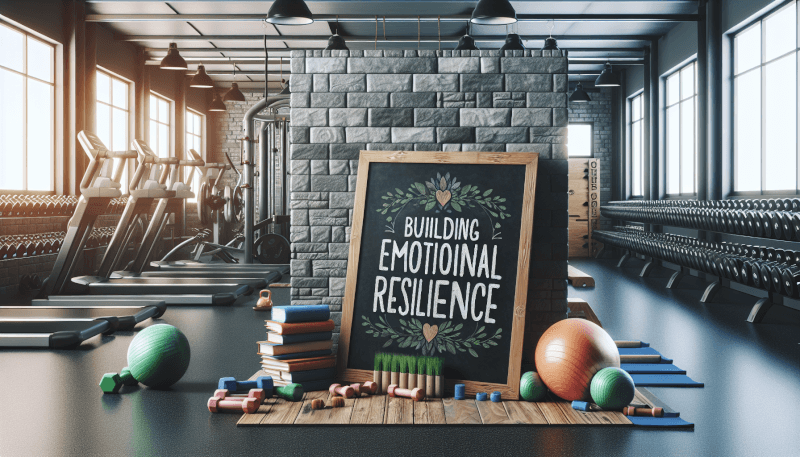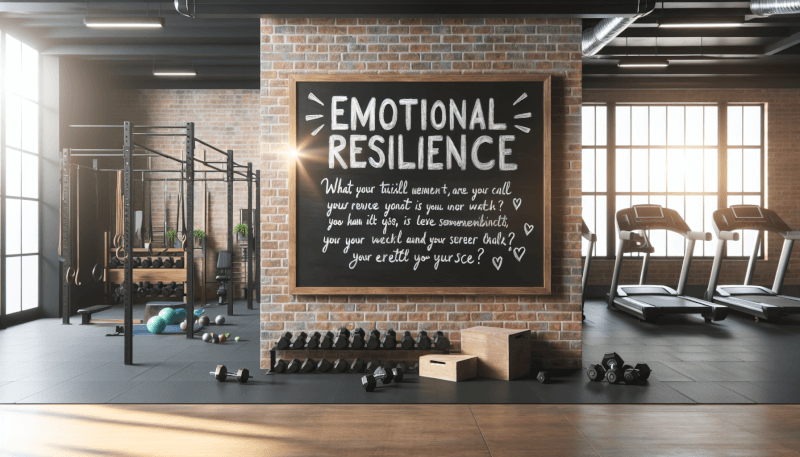Have you ever wondered how to build emotional resilience and strengthen your mental well-being? Look no further! We have the perfect solution for you – custom workout plans specifically designed to enhance your emotional resilience. In this article, we will explore the importance of emotional resilience and how targeted exercises can help you cultivate this invaluable trait. So, get ready to embark on a journey of self-discovery and personal growth as we delve into the world of custom workout plans for building emotional resilience.

1. Understanding Emotional Resilience
1.1 Definition of Emotional Resilience
Emotional resilience refers to one’s ability to cope with and bounce back from life’s challenges, setbacks, and stressors. It involves having the mental and emotional strength to adapt to difficult situations, overcome adversity, and maintain a positive outlook. In essence, emotional resilience is the capacity to navigate through life’s ups and downs with grace and resilience.
1.2 The Importance of Emotional Resilience
Emotional resilience plays a crucial role in our overall well-being and quality of life. It enables us to handle stress, maintain a sense of balance, and effectively manage our emotions. When we possess emotional resilience, we are better equipped to handle unexpected changes, setbacks, and disappointments. It also helps us maintain healthy relationships, communicate effectively, and make sound decisions. By cultivating emotional resilience, we can improve our mental and emotional health, leading to a more fulfilling and satisfying life.
1.3 Factors Affecting Emotional Resilience
Several factors can influence an individual’s level of emotional resilience. Childhood experiences, such as the presence of a supportive family environment or exposure to traumatic events, can shape a person’s ability to handle stress and adversity later in life. Additionally, personal traits like optimism, self-awareness, and problem-solving skills contribute to emotional resilience. The availability of a strong support system and access to coping mechanisms also play a significant role in building emotional resilience.
1.4 Benefits of Building Emotional Resilience
Building emotional resilience offers numerous benefits. Firstly, it enhances our ability to effectively manage stress. By developing the skills to navigate challenging situations, we become less prone to stress-related ailments like anxiety and depression. Emotional resilience also improves our problem-solving abilities, allowing us to find creative solutions to setbacks and obstacles. Moreover, it strengthens our relationships by promoting effective communication and empathy. By building emotional resilience, we can cultivate a more positive mindset, increase self-confidence, and experience greater overall well-being.
2. Assessing Your Current Emotional Resilience
2.1 Self-Reflection and Awareness
Assessing your current level of emotional resilience begins with self-reflection and awareness. Take the time to reflect on your past experiences and how you have handled various challenges. Consider how you managed stress, coped with setbacks, and bounced back from difficult situations. Pay attention to your emotional reactions and the effectiveness of your coping mechanisms. This self-reflection will provide valuable insights into your strengths and areas for improvement when it comes to emotional resilience.
2.2 Identifying Emotional Triggers
Identifying your emotional triggers is another essential step in assessing your emotional resilience. Emotional triggers are situations or events that elicit strong emotional reactions. They can range from specific people or places to certain topics or memories. By identifying your triggers, you can better understand and anticipate your emotional responses, allowing you to develop strategies to cope with them effectively.
2.3 Evaluating Coping Mechanisms
Evaluate the coping mechanisms you currently rely on to navigate through challenging situations. Are they constructive and healthy, or do they contribute to further distress? Recognize if you tend to use avoidance or unhealthy coping mechanisms, such as substance abuse, excessive distractions, or self-isolation. Make a note of effective coping strategies you already employ and consider expanding your repertoire of healthy coping mechanisms.
2.4 Seeking Professional Guidance
If you find it challenging to assess your emotional resilience on your own, seeking professional guidance can be immensely beneficial. A mental health professional can help you explore your emotions, identify patterns, and provide objective insights. They can assess your emotional resilience and assist you in developing a personalized plan to enhance it. Professional guidance can be especially valuable if you have experienced significant trauma or are struggling with persistent emotional difficulties.

3. Building a Strong Support System
3.1 Recognizing the Importance of Support
Building a strong support system is paramount in developing emotional resilience. Friends, family, and trusted individuals provide essential emotional support during challenging times. Recognize the importance of having a support system that you can rely on, lean on, and confide in when needed. Having an empathetic and understanding network can significantly contribute to your emotional well-being and resilience.
3.2 Identifying Supportive Individuals
Identify individuals who consistently demonstrate support and empathy in your life. These individuals may be friends, family members, mentors, or colleagues. Seek out those who uplift and encourage you, rather than individuals who bring negativity or drain your emotional energy. Surrounding yourself with supportive individuals fosters a sense of belonging, provides emotional validation, and strengthens your ability to handle adversity.
3.3 Nurturing Meaningful Relationships
Nurturing meaningful relationships within your support system is essential for building emotional resilience. Engage in open and honest communication with your loved ones, sharing both your triumphs and challenges. Foster trust, empathy, and understanding in your relationships by actively listening and offering support to those around you as well. As you strengthen your connections, you create a foundation of emotional support that will help you navigate through difficult times.
3.4 Seeking Support Groups or Therapy
In addition to nurturing individual relationships, consider seeking out support groups or therapy. Support groups allow you to connect with others who may be facing similar challenges, offering a sense of shared understanding and valuable insights. Therapy, whether individual or group, provides a safe space to explore your emotions, develop coping strategies, and receive professional guidance. Utilizing these resources can significantly enhance your emotional resilience and provide additional tools for navigating life’s obstacles.
4. Developing Healthy Coping Strategies
4.1 Identifying Unhealthy Coping Mechanisms
In order to build emotional resilience, it is crucial to identify and address any unhealthy coping mechanisms you may rely on. Unhealthy coping mechanisms can include excessive alcohol or drug use, emotional eating, self-harm, or risky behaviors. These methods provide temporary relief but ultimately hinder your ability to navigate challenges effectively. Recognize these patterns and commit to replacing them with healthier alternatives.
4.2 Exploring New Coping Strategies
Explore and experiment with new coping strategies to replace unhealthy habits. Some effective coping mechanisms include engaging in hobbies or activities you enjoy, journaling, practicing deep breathing exercises, or seeking support from a trusted friend. Different techniques work for different individuals, so it may take time to find what works best for you. Be open to trying new strategies and be patient with yourself as you explore different approaches.
4.3 Practicing Mindfulness and Meditation
Incorporating mindfulness and meditation into your daily routine can be instrumental in building emotional resilience. Mindfulness involves intentionally focusing on the present moment and accepting it non-judgmentally. This practice allows you to cultivate self-awareness, reduce stress, and develop a greater sense of resilience. Meditation, on the other hand, involves quieting the mind, reducing mental clutter, and fostering a sense of calm. Regular mindfulness and meditation practice can enhance your emotional well-being and provide a solid foundation for dealing with life’s challenges.
4.4 Engaging in Physical Activities
Engaging in regular physical activities is another powerful way to build emotional resilience. Exercise releases endorphins, which are natural mood-boosting chemicals in the brain. Physical activities like running, yoga, or dancing can help regulate stress levels, improve sleep, and enhance overall well-being. Find activities that you enjoy and make them a regular part of your routine to reap the emotional and physical benefits they offer.

5. Enhancing Emotional Intelligence
5.1 Understanding Emotional Intelligence
Emotional intelligence refers to the ability to recognize, understand, and manage our own emotions, as well as the emotions of others. It involves being aware of our emotional state, effectively communicating our feelings, and empathizing with others. Enhancing emotional intelligence is a key aspect of building emotional resilience, as it allows us to navigate relationships and manage our emotions more effectively.
5.2 Developing Self-awareness
Developing self-awareness is a crucial component of enhancing emotional intelligence and building emotional resilience. Take the time to reflect on your emotions, thoughts, and behaviors. Notice patterns and triggers that impact your emotional state. Cultivating self-awareness enables you to regulate and manage your emotions more effectively, leading to increased emotional resilience.
5.3 Managing Emotions Effectively
Managing emotions effectively is another vital aspect of emotional intelligence. This involves recognizing and acknowledging your emotions without judgment and finding healthy ways to express and process them. Develop strategies for regulating your emotions, such as deep breathing exercises, taking breaks when needed, or seeking support from others. By managing your emotions effectively, you can navigate through difficulties with greater resilience and clarity.
5.4 Empathy and Social Skills
Empathy and social skills are key components of emotional intelligence that contribute to emotional resilience. Empathy involves understanding and sharing the feelings of others, providing support, and demonstrating compassion. Social skills encompass effective communication, active listening, and conflict resolution. By developing these skills, you can strengthen your relationships, foster a sense of belonging, and build emotional resilience through meaningful connections with others.
6. Cultivating a Positive Mindset
6.1 Recognizing Negative Thought Patterns
Cultivating a positive mindset begins with recognizing negative thought patterns. Negative thoughts can perpetuate a cycle of pessimism, self-doubt, and low self-esteem. Pay attention to recurring negative thoughts or self-talk, such as “I’m not good enough” or “Everything always goes wrong.” Recognizing these patterns is the first step towards challenging and replacing them with positive alternatives.
6.2 Challenging Limiting Beliefs
Once you have identified negative thought patterns, it is essential to challenge and reframe them. Replace self-limiting beliefs with more positive and empowering thoughts. For example, if you often think, “I will never succeed,” challenge this belief by reminding yourself of past accomplishments or focusing on the actions you can take to overcome challenges. By actively challenging and reframing limiting beliefs, you can cultivate a more positive and resilient mindset.
6.3 Practicing Gratitude
Practicing gratitude is a powerful tool for cultivating a positive mindset and building emotional resilience. Regularly expressing gratitude for the positive aspects of your life can shift your focus away from negative thoughts and foster a sense of appreciation. Start a gratitude journal, where you write down things you are grateful for each day. This practice promotes resilience by training your mind to seek out and appreciate the positive, even in challenging times.
6.4 Implementing Positive Affirmations
Implementing positive affirmations can further strengthen your positive mindset and emotional resilience. Positive affirmations are statements designed to challenge negative thoughts and replace them with positive ones. Repeat affirmations such as “I am strong,” “I am capable,” or “I can overcome any challenge” to reinforce a resilient mindset. By consistently practicing positive affirmations, you can rewire your thinking and bolster your emotional resilience.

7. Learning Stress Management Techniques
7.1 Identifying Sources of Stress
Learning stress management techniques starts with identifying the sources of stress in your life. Take inventory of situations, relationships, or circumstances that consistently cause stress. These stressors can be external, such as work deadlines or financial difficulties, or internal, such as self-imposed expectations or negative self-talk. By pinpointing your stressors, you can begin to develop strategies to mitigate their impact.
7.2 Relaxation Techniques
Practicing relaxation techniques is an effective way to manage stress and build emotional resilience. Techniques like deep breathing exercises, progressive muscle relaxation, or guided imagery can help reduce stress levels and promote relaxation. Incorporate these techniques into your daily routine, especially during times of heightened stress, to create a sense of calm and increase your resilience.
7.3 Time Management and Prioritization
Effective time management and prioritization are essential skills for managing stress and building emotional resilience. Assess your commitments and responsibilities, and prioritize tasks based on their importance and urgency. Break large tasks into smaller, manageable steps to prevent overwhelm. By effectively managing your time and priorities, you can minimize stress, maintain balance, and approach challenges with greater resilience.
7.4 Setting Realistic Goals
Setting realistic goals is another crucial aspect of stress management and emotional resilience. Establish goals that are attainable and align with your values and priorities. Break larger goals into smaller milestones to track progress and celebrate achievements along the way. By setting realistic goals, you can avoid excessive pressure, maintain motivation, and enhance your emotional resilience.
8. Developing Emotional Flexibility
8.1 Embracing Change and Uncertainty
Developing emotional flexibility involves embracing change and uncertainty. Life is full of unexpected twists and turns, and the ability to adapt is vital for building emotional resilience. Embrace change as an opportunity for growth and learning, rather than viewing it as a threat. Recognize that uncertainty is a natural part of life and practice accepting situations that are beyond your control. By cultivating emotional flexibility, you can navigate through transitions and challenges with greater resilience and ease.
8.2 Adapting to New Situations
Adapting to new situations is a key skill in building emotional resilience. Flexibility and adaptability allow you to respond effectively to changing circumstances. Approach new situations with an open mind and a willingness to learn. Embrace the unknown and focus on finding solutions rather than dwelling on obstacles. By fostering adaptability, you can navigate unfamiliar territory with confidence and resilience.
8.3 Practicing Resilience in the Face of Challenges
Building emotional resilience involves practicing resilience in the face of challenges. Rather than becoming overwhelmed or discouraged by setbacks, view them as opportunities for growth. Cultivate a mindset that welcomes challenges as valuable learning experiences. When faced with adversity, remind yourself of past successes and draw upon your inner strength to persevere. By practicing resilience, you can face challenges head-on and emerge stronger and more resilient.
8.4 Embracing Failure as a Learning Opportunity
Embracing failure as a learning opportunity is a hallmark of emotional resilience. Rather than fearing failure, use it as a chance to learn and grow. Reflect on what went wrong, the lessons you can extract from the experience, and how you can improve in the future. Understand that failure is not a reflection of your worth or abilities but a natural part of the learning process. By embracing failure, you become more resilient and better equipped to handle setbacks on your journey toward emotional well-being.

9. Fostering Self-Care Practices
9.1 Prioritizing Physical Health
Fostering self-care practices starts with prioritizing your physical health. Engage in activities that nourish your body, such as eating a balanced diet, getting regular exercise, and prioritizing adequate sleep. Maintaining physical health enhances your overall well-being and contributes to emotional resilience. Prioritize self-care by setting aside time for activities that promote physical health.
9.2 Nourishing Mental and Emotional Well-being
In addition to physical health, it is crucial to prioritize the nourishment of your mental and emotional well-being. Engage in activities that bring you joy, like pursuing hobbies, spending time in nature, or practicing mindfulness. Set boundaries to protect your mental and emotional energy, and seek activities that replenish and rejuvenate you. By nourishing your mental and emotional well-being, you can enhance your emotional resilience and overall quality of life.
9.3 Setting Boundaries and Saying No
Setting boundaries and saying no are important self-care practices that support emotional resilience. Recognize your limits and be mindful of not spreading yourself too thin. Practice assertiveness and communicate your needs and limits with others. Saying no when necessary allows you to protect your emotional well-being and prevent feelings of overwhelm or burnout. By setting healthy boundaries and saying no when needed, you safeguard your resilience and ensure that you have the capacity to effectively handle life’s challenges.
9.4 Taking Time for Personal Hobbies and Interests
Taking time for personal hobbies and interests is a meaningful way to foster self-care and build emotional resilience. Engage in activities that bring you joy and allow you to relax and recharge. Whether it’s painting, playing an instrument, gardening, or cooking, engaging in hobbies helps you tap into your creativity and cultivate a sense of fulfillment. By making time for personal interests, you reaffirm your commitment to self-care and enhance your emotional well-being.
10. Seeking Professional Help if Needed
10.1 Recognizing When to Seek Help
Recognizing when to seek professional help is crucial for building emotional resilience. If you find that your emotional difficulties persist, significantly impact your daily functioning, or interfere with your ability to navigate challenges, it may be time to seek professional guidance. Common signs that indicate the need for professional help include prolonged feelings of sadness, anxiety, or hopelessness, a significant decline in functioning, or challenges coping with daily life.
10.2 Consulting Mental Health Professionals
Consulting mental health professionals can provide valuable guidance and support when building emotional resilience. Mental health professionals, such as therapists or counselors, are trained to help individuals navigate emotional difficulties, develop coping strategies, and cultivate resilience. They provide a safe and confidential space for you to explore your emotions and challenges and work collaboratively towards enhancing your emotional well-being.
10.3 Therapy Options for Building Emotional Resilience
Various therapy options can assist in building emotional resilience. Cognitive-behavioral therapy (CBT) helps individuals identify and challenge negative thoughts and replace them with more positive and empowering ones. Dialectical behavior therapy (DBT) focuses on emotional regulation and developing coping skills. Additionally, mindfulness-based therapies, such as acceptance and commitment therapy (ACT) or mindfulness-based stress reduction (MBSR), can support the cultivation of emotional resilience. Consult a mental health professional to determine which therapy option may be best suited to your needs and goals.
10.4 Integrating Professional Guidance into Custom Plan
Integrating professional guidance into your custom plan for building emotional resilience is essential. A mental health professional can work with you to create a personalized plan based on your unique needs, challenges, and goals. They can provide valuable insights, support, and coping strategies tailored to your specific circumstances. By integrating professional guidance into your plan, you enhance the effectiveness and success of your journey towards greater emotional resilience.
In conclusion, building emotional resilience is a lifelong process that involves various strategies and practices. By understanding the concept of emotional resilience, assessing your current level of resilience, building a strong support system, developing healthy coping strategies, enhancing emotional intelligence, cultivating a positive mindset, learning stress management techniques, developing emotional flexibility, fostering self-care practices, and seeking professional help if needed, you can actively strengthen your emotional resilience and enhance your overall well-being. Remember, building emotional resilience takes time and effort, but the rewards are well worth it. You have the power to become more resilient and navigate life’s challenges with grace and strength. Embrace the journey and believe in your capacity to build emotional resilience.


